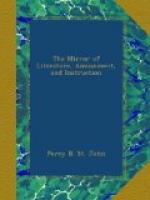Munden’s style of acting was exuberant with humour. His face was his fortune: it was all changeful nature: his eye glistened and rolled, and lit up alternately every corner of his laughing face: “then the eternal tortuosities of his nose, and the alarming descent of his chin, contrasted, as it eternally was, with the portentous rise of his eyebrows.” He has been blamed for grimace, but it should be remembered that many of his characters verged on caricatures. That he could play comic characters chastely was amply shown in his Polonius; and touch the finer feelings of our nature was exemplified in his Old Dornton, in Holcroft’s catching play of the Road to Ruin. The fine discrimination evinced by Munden in the grief and joy of the exclamations “Who would be a father,” and “Who would not be a father,” will not soon be forgotten. We think we see and hear his stout figure, in black, with florid face, and powdered hair, his raised and clasped hands,—rushing out of the lockup-house scene in all the fervid extasy of a father rejoicing at the escape of his son from destruction. In Crack, Dozey, Nipperkin, and other drunken characters, his drollery was irresistible. His intoxication displayed as much discrimination as his pathetic performances. Who can forget his stare in being detected in his fuddling as Dozey, and his plea for drinking to “wa-ash down your honour’s health:” or his anti-polarity as Nipperkin, when his very legs seemed drunk beneath him; his attempt to set down the keg would stagger the disbelievers of perpetual motion. Again, who did not relish the richness of his voice, and the arch crispness which he gave to some words, while others came not trippingly off his tongue, but lingered and jarred with an effect which accounts for so many imitators. His mouth had a peculiar twist, somewhat resembling that of Mathews, which at times almost forbad his plain speaking.
We have seen that Munden was
A man that fortune’s buffets and
rewards
Had ta’en with equal thanks.




